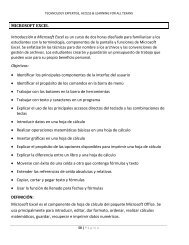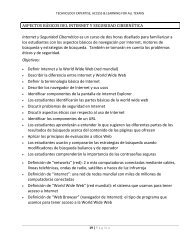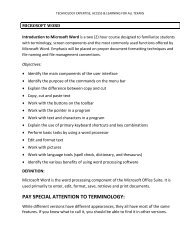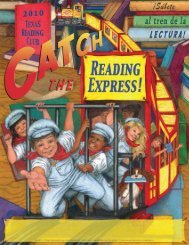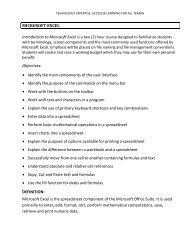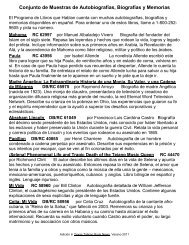- Page 1 and 2: 1 Sail Away With Books!
- Page 3 and 4: Table Of Contents Sail Away With Bo
- Page 5 and 6: Sail Away With Books! Something Abo
- Page 7 and 8: Sail Away With Books! • Add finis
- Page 9 and 10: Sail Away With Books! bowling, read
- Page 11 and 12: Introduction Sail Away With Books!
- Page 13 and 14: Sail Away With Books! Theme Songs T
- Page 15 and 16: Sail Away With Books! • Libraries
- Page 17 and 18: Sail Away With Books! Phonological
- Page 19 and 20: Sail Away With Books! Some writers
- Page 21 and 22: Sail Away With Books! There are sev
- Page 23 and 24: Sail Away With Books! Applications
- Page 25: Sail Away With Books! Public Librar
- Page 29 and 30: Sail Away With Books! home and leav
- Page 31 and 32: Suppliers for Incentives, Crafts, a
- Page 33 and 34: Sail Away With Books! Rhode Island
- Page 35 and 36: Sail Away With Books! Sail Away Wit
- Page 37 and 38: Sail Away With Books! Sail Away Wit
- Page 39 and 40: The Pirates’ Code: A Reader’s T
- Page 41 and 42: Sail Away With Books! CAPT. JACK: T
- Page 43 and 44: Reading to the Rescue: A Reader’s
- Page 45 and 46: Sail Away With Books! BIG MOUSE: Wh
- Page 47 and 48: Puppet Plays Sail Away With Books!
- Page 49 and 50: Sail Away With Books! WIFE: (enteri
- Page 51 and 52: Sail Away With Books! WIFE: If you
- Page 53 and 54: Little Frog’s Big Trip: A Puppet
- Page 55 and 56: Sail Away With Books! LITTLE FROG:
- Page 57 and 58: Stories Sail Away With Books! 1-2-3
- Page 59 and 60: Sail Away With Books! Sure enough,
- Page 61 and 62: Sail Away With Books! available for
- Page 63 and 64: Sail Away With Books! Scissors Penc
- Page 65 and 66: Sail Away With Books! Treasure Isla
- Page 67 and 68: Sail Away With Books! Life on a Sub
- Page 69 and 70: Sail Away With Books! Crafts Octopu
- Page 71 and 72: Guest Speakers Sail Away With Books
- Page 73 and 74: Patterns Boat Sail Away With Books!
- Page 75 and 76: Starfish Nametag Sail Away With Boo
- Page 77 and 78:
Sail Away With Books! sailboats and
- Page 79 and 80:
Sail Away With Books! Puzzle Sticks
- Page 81 and 82:
Sail Away With Books! Scuttlebutt W
- Page 83 and 84:
Sail Away With Books! Look What You
- Page 85 and 86:
Sail Away With Books! Introduction
- Page 87 and 88:
Sail Away With Books! While the pro
- Page 89 and 90:
Sail Away With Books! Bugs on a Log
- Page 91 and 92:
Sail Away With Books! I Found A Toa
- Page 93 and 94:
Sail Away With Books! The Singing F
- Page 95 and 96:
Sail Away With Books! “Heal, Heal
- Page 97 and 98:
Sail Away With Books! Y siguió sal
- Page 99 and 100:
Sail Away With Books! Navegando en
- Page 101 and 102:
Sail Away With Books! Sun, little s
- Page 103 and 104:
Sail Away With Books! Rhymes and Po
- Page 105 and 106:
Sail Away With Books! the parents o
- Page 107 and 108:
Sail Away With Books! the child in
- Page 109 and 110:
Sail Away With Books! Bulletin Boar
- Page 111 and 112:
Sail Away With Books! Tiny Kim (Tra
- Page 113 and 114:
Sail Away With Books! The Bath Time
- Page 115 and 116:
Sail Away With Books! mimicking the
- Page 117 and 118:
Sail Away With Books! into the stra
- Page 119 and 120:
Sail Away With Books! Fingerplays D
- Page 121 and 122:
Sail Away With Books! Velerito Blan
- Page 123 and 124:
Sail Away With Books! Follow the di
- Page 125 and 126:
Sail Away With Books! Professional
- Page 127 and 128:
127 Sail Away With Books!
- Page 129 and 130:
129 Sail Away With Books!
- Page 131 and 132:
131 Sail Away With Books!
- Page 133 and 134:
133 Sail Away With Books!
- Page 135 and 136:
135 Sail Away With Books!
- Page 137 and 138:
137 Sail Away With Books!
- Page 139 and 140:
Sail Away With Books! Cloud Nametag
- Page 141 and 142:
Sail Away With Books! El patito 141
- Page 143 and 144:
143 Sail Away With Books!
- Page 145 and 146:
145 Sail Away With Books!
- Page 147 and 148:
Sail Away With Books! nametag. If y
- Page 149 and 150:
Sail Away With Books! large toy too
- Page 151 and 152:
Sail Away With Books! earlier than
- Page 153 and 154:
Sail Away With Books! Graham cracke
- Page 155 and 156:
Sail Away With Books! Sing “Spide
- Page 157 and 158:
Sail Away With Books! Snake Bracele
- Page 159 and 160:
Sail Away With Books! Books are Foo
- Page 161 and 162:
Sail Away With Books! Two little co
- Page 163 and 164:
Sail Away With Books! Pizza! How’
- Page 165 and 166:
Sail Away With Books! Directions Pr
- Page 167 and 168:
Sail Away With Books! Shaving cream
- Page 169 and 170:
Sail Away With Books! New Shoes, Re
- Page 171 and 172:
Sail Away With Books! Find a foot a
- Page 173 and 174:
Sail Away With Books! Videos/DVDs/F
- Page 175 and 176:
Sail Away With Books! Two little bi
- Page 177 and 178:
Sail Away With Books! Games and Act
- Page 179 and 180:
Sail Away With Books! This Boat by
- Page 181 and 182:
Sail Away With Books! Now the bell
- Page 183 and 184:
2007 Texas Reading Club Manual Vide
- Page 185 and 186:
2007 Texas Reading Club Manual A bi
- Page 187 and 188:
2007 Texas Reading Club Manual Fami
- Page 189 and 190:
2007 Texas Reading Club Manual Patt
- Page 191 and 192:
2007 Texas Reading Club Manual Bath
- Page 193 and 194:
2007 Texas Reading Club Manual Snak
- Page 195 and 196:
2007 Texas Reading Club Manual Ice
- Page 197 and 198:
2007 Texas Reading Club Manual Colo
- Page 199 and 200:
2007 Texas Reading Club Manual 200
- Page 201 and 202:
2007 Texas Reading Club Manual 202
- Page 203 and 204:
2007 Texas Reading Club Manual Floa
- Page 205 and 206:
2007 Texas Reading Club Manual Traf
- Page 207 and 208:
2007 Texas Reading Club Manual Fami
- Page 209 and 210:
2007 Texas Reading Club Manual Name
- Page 211 and 212:
2007 Texas Reading Club Manual Five
- Page 213 and 214:
2007 Texas Reading Club Manual Sea
- Page 215 and 216:
2007 Texas Reading Club Manual Howa
- Page 217 and 218:
2007 Texas Reading Club Manual Refr
- Page 219 and 220:
2007 Texas Reading Club Manual Gues
- Page 221 and 222:
2007 Texas Reading Club Manual Serv
- Page 223 and 224:
2007 Texas Reading Club Manual Dire
- Page 225 and 226:
2007 Texas Reading Club Manual Web
- Page 227 and 228:
2007 Texas Reading Club Manual Audi
- Page 229 and 230:
2007 Texas Reading Club Manual Web-
- Page 231 and 232:
2007 Texas Reading Club Manual Disp
- Page 233 and 234:
2007 Texas Reading Club Manual Dire
- Page 235 and 236:
2007 Texas Reading Club Manual Vide
- Page 237 and 238:
2007 Texas Reading Club Manual (Tra
- Page 239 and 240:
2007 Texas Reading Club Manual Peng
- Page 241 and 242:
2007 Texas Reading Club Manual Peng
- Page 243 and 244:
2007 Texas Reading Club Manual The
- Page 245 and 246:
2007 Texas Reading Club Manual LION
- Page 247 and 248:
2007 Texas Reading Club Manual thro
- Page 249 and 250:
2007 Texas Reading Club Manual bake
- Page 251 and 252:
2007 Texas Reading Club Manual (Son
- Page 253 and 254:
2007 Texas Reading Club Manual Web
- Page 255 and 256:
2007 Texas Reading Club Manual 256
- Page 257 and 258:
2007 Texas Reading Club Manual 258
- Page 259 and 260:
2007 Texas Reading Club Manual 260
- Page 261 and 262:
2007 Texas Reading Club Manual Five
- Page 263 and 264:
2007 Texas Reading Club Manual Pick
- Page 265 and 266:
2007 Texas Reading Club Manual Peng
- Page 267 and 268:
2007 Texas Reading Club Manual Peng
- Page 269 and 270:
2007 Texas Reading Club Manual Zoo
- Page 271 and 272:
2007 Texas Reading Club Manual 272
- Page 273 and 274:
2007 Texas Reading Club Manual Five
- Page 275 and 276:
2007 Texas Reading Club Manual Croc
- Page 277 and 278:
2007 Texas Reading Club Manual Book
- Page 279 and 280:
2007 Texas Reading Club Manual Tong
- Page 281 and 282:
2007 Texas Reading Club Manual The
- Page 283 and 284:
2007 Texas Reading Club Manual Game
- Page 285 and 286:
2007 Texas Reading Club Manual Out
- Page 287 and 288:
2007 Texas Reading Club Manual LEAD
- Page 289 and 290:
2007 Texas Reading Club Manual of c
- Page 291 and 292:
2007 Texas Reading Club Manual The
- Page 293 and 294:
2007 Texas Reading Club Manual Ince
- Page 295 and 296:
2007 Texas Reading Club Manual bubb
- Page 297 and 298:
2007 Texas Reading Club Manual Lear
- Page 299 and 300:
2007 Texas Reading Club Manual “S
- Page 301 and 302:
2007 Texas Reading Club Manual Robi
- Page 303 and 304:
2007 Texas Reading Club Manual Q. W
- Page 305 and 306:
2007 Texas Reading Club Manual Pira
- Page 307 and 308:
2007 Texas Reading Club Manual High
- Page 309 and 310:
2007 Texas Reading Club Manual Book
- Page 311 and 312:
2007 Texas Reading Club Manual Stor
- Page 313 and 314:
2007 Texas Reading Club Manual Jan
- Page 315 and 316:
2007 Texas Reading Club Manual Fold
- Page 317 and 318:
2007 Texas Reading Club Manual Patt
- Page 319 and 320:
2007 Texas Reading Club Manual Youn
- Page 321 and 322:
2007 Texas Reading Club Manual Boys
- Page 323 and 324:
2007 Texas Reading Club Manual Deve
- Page 325 and 326:
2007 Texas Reading Club Manual have
- Page 327 and 328:
2007 Texas Reading Club Manual Deve
- Page 329 and 330:
2007 Texas Reading Club Manual Bull
- Page 331 and 332:
2007 Texas Reading Club Manual Surf
- Page 333 and 334:
2007 Texas Reading Club Manual This
- Page 335 and 336:
2007 Texas Reading Club Manual Then
- Page 337 and 338:
2007 Texas Reading Club Manual Cros
- Page 339 and 340:
2007 Texas Reading Club Manual La L
- Page 341 and 342:
2007 Texas Reading Club Manual The
- Page 343 and 344:
2007 Texas Reading Club Manual Dan
- Page 345 and 346:
2007 Texas Reading Club Manual Refr
- Page 347 and 348:
2007 Texas Reading Club Manual Orie
- Page 349 and 350:
2007 Texas Reading Club Manual Surf
- Page 351 and 352:
2007 Texas Reading Club Manual Many
- Page 353 and 354:
2007 Texas Reading Club Manual Prov
- Page 355 and 356:
2007 Texas Reading Club Manual This
- Page 357 and 358:
2007 Texas Reading Club Manual Book
- Page 359 and 360:
2007 Texas Reading Club Manual Teen
- Page 361 and 362:
2007 Texas Reading Club Manual Solu
- Page 363 and 364:
2007 Texas Reading Club Manual Bibl
- Page 365 and 366:
2007 Texas Reading Club Manual The
- Page 367 and 368:
2007 Texas Reading Club Manual Bird
- Page 369 and 370:
2007 Texas Reading Club Manual Budw
- Page 371 and 372:
2007 Texas Reading Club Manual Coer
- Page 373 and 374:
2007 Texas Reading Club Manual This
- Page 375 and 376:
2007 Texas Reading Club Manual Jack
- Page 377 and 378:
2007 Texas Reading Club Manual Comb
- Page 379 and 380:
2007 Texas Reading Club Manual Grub
- Page 381 and 382:
2007 Texas Reading Club Manual Inkp
- Page 383 and 384:
2007 Texas Reading Club Manual Keat
- Page 385 and 386:
2007 Texas Reading Club Manual Fran
- Page 387 and 388:
2007 Texas Reading Club Manual Inch
- Page 389 and 390:
2007 Texas Reading Club Manual Soy
- Page 391 and 392:
2007 Texas Reading Club Manual Mont
- Page 393 and 394:
2007 Texas Reading Club Manual This
- Page 395 and 396:
2007 Texas Reading Club Manual Pink
- Page 397 and 398:
2007 Texas Reading Club Manual Lear
- Page 399 and 400:
2007 Texas Reading Club Manual This
- Page 401 and 402:
2007 Texas Reading Club Manual Silv
- Page 403 and 404:
2007 Texas Reading Club Manual A bo
- Page 405 and 406:
2007 Texas Reading Club Manual Wadd
- Page 407 and 408:
2007 Texas Reading Club Manual Wojt
- Page 409 and 410:
2007 Texas Reading Club Manual Bath
- Page 411 and 412:
2007 Texas Reading Club Manual Todd
- Page 413 and 414:
2007 Texas Reading Club Manual Raff
- Page 415 and 416:
2007 Texas Reading Club Manual Angu
- Page 417 and 418:
2007 Texas Reading Club Manual Jura
- Page 419 and 420:
2007 Texas Reading Club Manual Whit
- Page 421 and 422:
! Navega lejos con libros! Promocio
- Page 423 and 424:
! ! ! ! ! ! ! ! Navega lejos con li
- Page 425 and 426:
2007 Texas Reading Club Artwork by
- Page 427 and 428:
Library Child’s Name Librarian Da
- Page 429 and 430:
Sail Away With Books! 2007 Texas Re
- Page 431 and 432:
Sail Away With Books! 2007 Texas Re
- Page 433 and 434:
Follow the treasure map to the X! C
- Page 435 and 436:
6. 7. 8. 9. 10. 11. 12. 13. 14. 15.
- Page 437:
Escribe el total de minutos aquí:


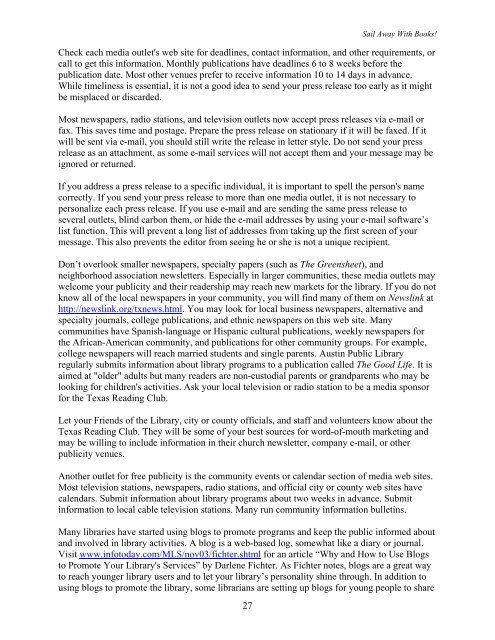
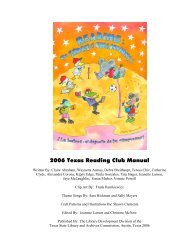
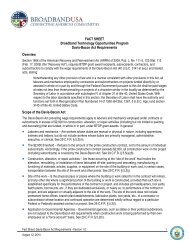

![Harry Potter [pdf]](https://img.yumpu.com/27329912/1/190x245/harry-potter-pdf.jpg?quality=85)
![Aplicaciones del Programa de Libros que Hablan [pdf] - Texas State ...](https://img.yumpu.com/27329907/1/190x245/aplicaciones-del-programa-de-libros-que-hablan-pdf-texas-state-.jpg?quality=85)


